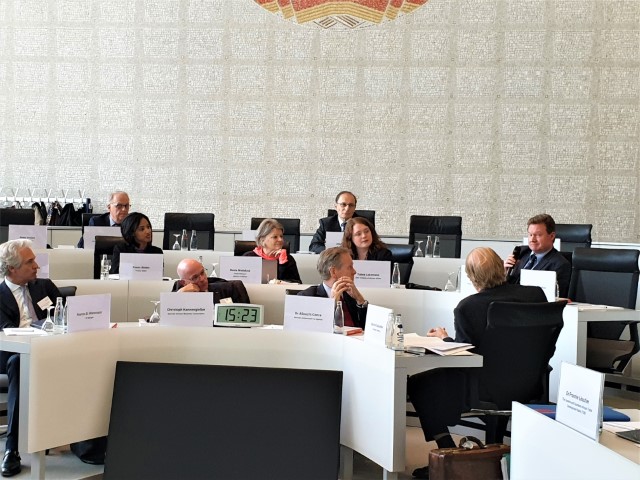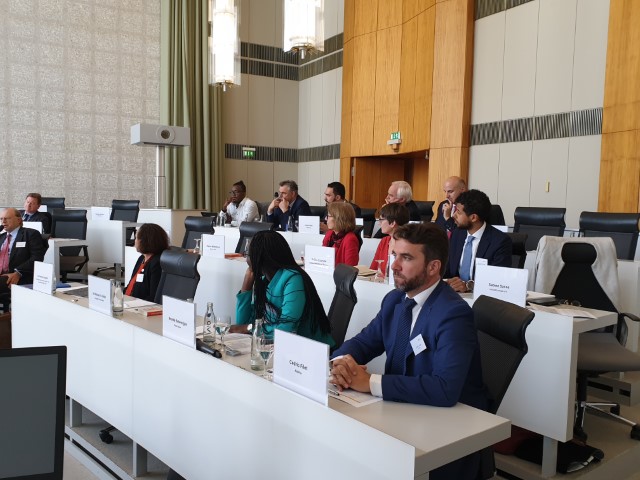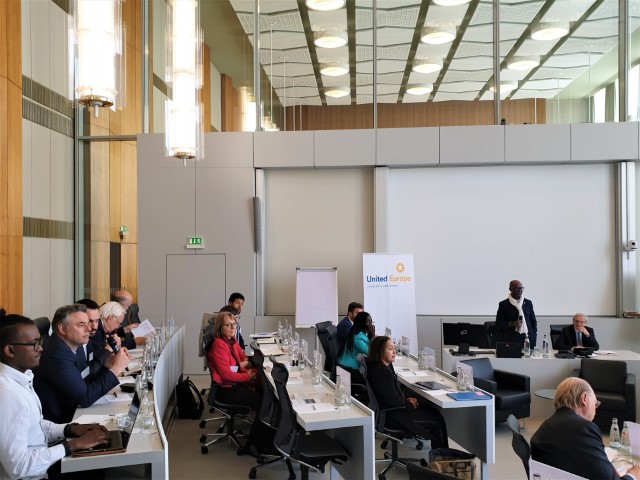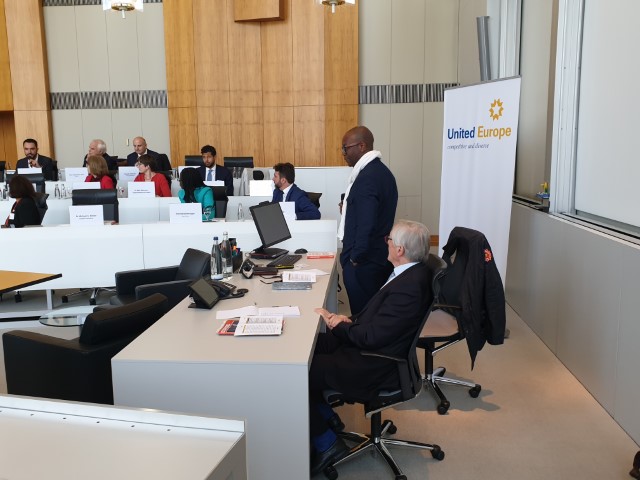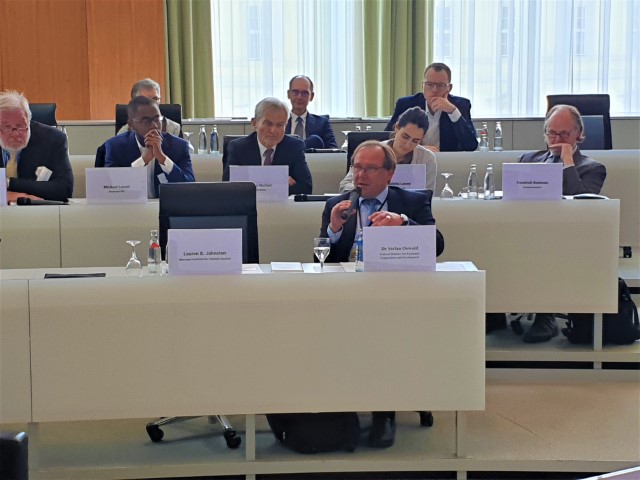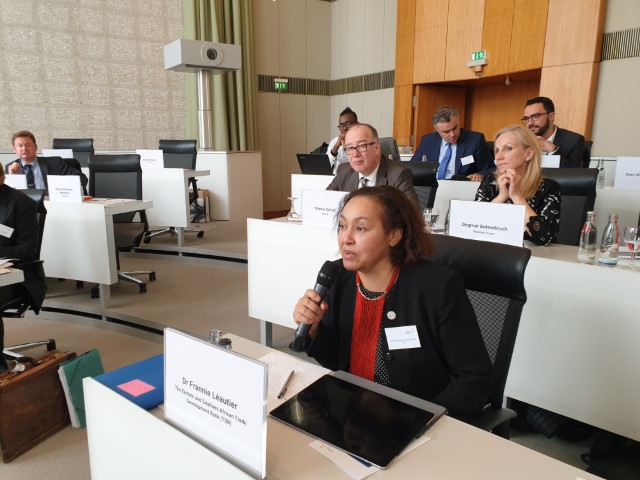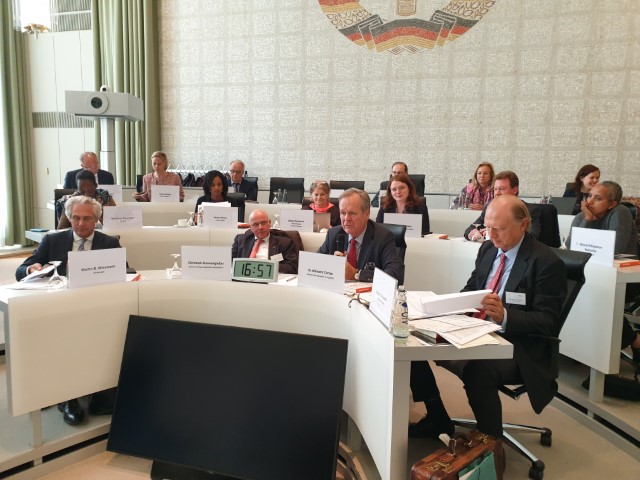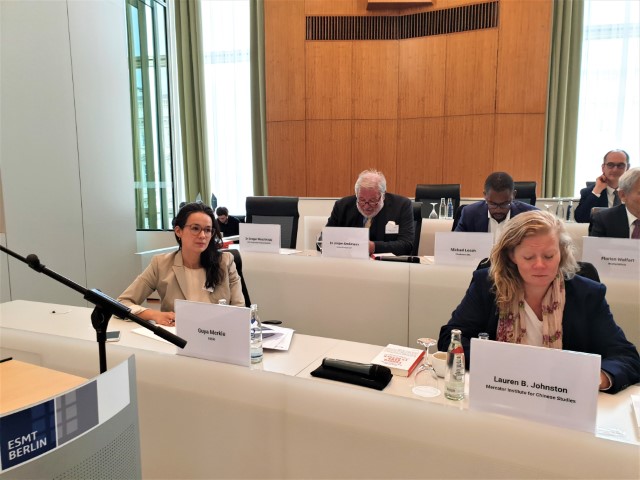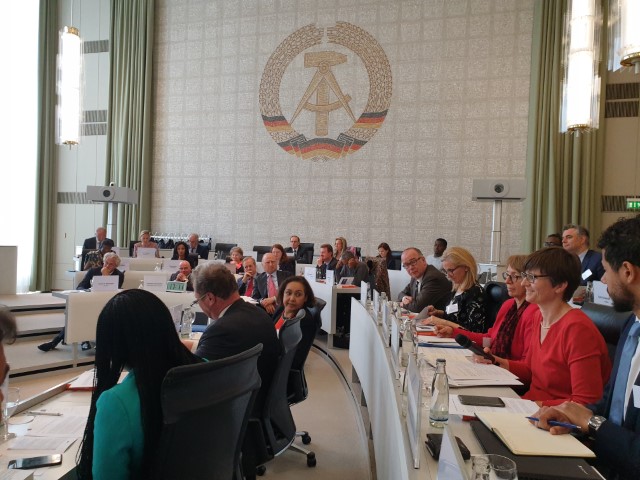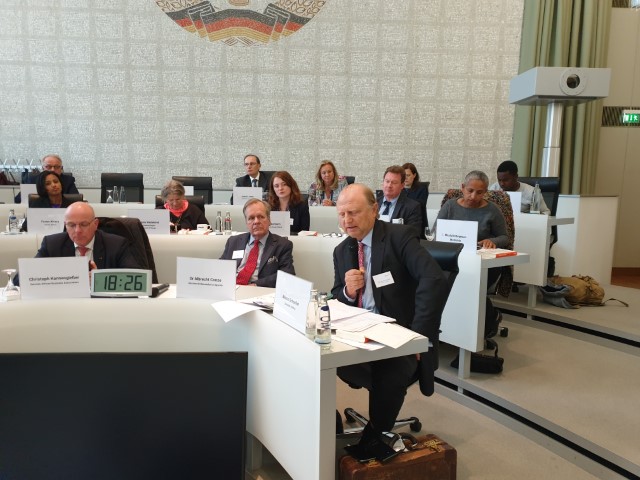On Monday, 6th May, United Europe for the first time hosted a CEO Roundtable focussing on the need for new European and African relations. The discussion took part at ESMT Berlin.
The business community across Europe and Africa has much to gain from a new approach towards joint business. This would need to lead to more cooperation; more proactive and holistic joint problem solving, resulting in truly win-win economic partnerships between Africa and Europe. This new approach can and should not rely on governments to set the pace and shoulder all risks.
But how can this be achieved with a politically weakened and more inward-looking Europe and a highly fragmented African continent of 55 countries with insignificant levels of intra-African trade which is only now moving ahead to operationalise a Continental Free Trade Area? Due to the recent history of political and economic instability and poor governance, many players in the European private sector – understandably – keep perceiving Africa as a highly risky business environment. How should and could Europe support Africa’s further development in a spirit of true partnership? To what extent is there still a demand for European engagement as China is enticing many African governments with its Belt and Road Initiative?
The increasing sums invested in Africa by the EU, North America and Asia are remarkable. However, the scale of the growth of China’s activities in the African markets in recent years is still more impressive. China exports more than 90 billion dollars to and imports more than 50 billion dollars from African countries. Although it’s still less than the investment of all European countries together (in 2018 the EU exported goods to the value of 115 billion US dollars and has imported more than 130 Billion US dollars, plus about 30 billion dollars from non-EU European countries), Chinese trade with Africa today is 20 times higher than it was in 2000. Chinese President Xi Jinping has visited Africa nine times last year, a measure of the importance of Africa for the Chinese government.
The message is clear: Europe has to change its view on Africa and how it operates on that continent. Africa has become one of the most dynamic continents in the world. Europeans used to see Africa mostly as a continent of crisis, wars and corruption. This is in many parts still true today, however it doesn’t tell the whole story of Africa. Africa is diverse and different, like Europe with manifold levels of development and education, cultures, threats and dangers, but also hopes and opportunities. Both are immensely affected by each other in many ways: trade, natural resources, migration.
In contrast to Europe, whose population on current trends is aging fast, Africa is the most dynamic continent, with the number of its citizens doubling from today’s 1.3 billion people to an estimated 2.5 billion by 2050. How Africa and the world as a whole responds to this by providing sufficient jobs, education and investment in general, will shape the continents future and will be a major challenge. Demography and economics are the key elements that will shape the next thirty years of Africa’s future…and thus Europe’s as well.
Africa needs to create about 20 million new jobs per year in order to give Africa’s young and growing population opportunities for the future and the chance to build a life in their home countries.
This is why the German Ministry for Economic Cooperation and Development (BMZ) has developed the cornerstones for a “Marshall Plan with Africa.”
Germany has used the G20 Presidency (1.12.2016 – 30.11.2017) to highlight and support the importance of a new partnership with Africa focussing on investments and job creation. At the G20 Africa Summit in Berlin, the “Compact with Africa” was launched as an offer for every African country to improve its macroeconomics and economic governance. The Ivory Coast, Ghana, Morocco, Senegal, Rwanda, Ethiopia and Tunisia were the seven countries that initially applied for the “compact”. In the meantime, a total of 12 countries became members of the compact. Besides the countries mentioned, Burkina Faso, Guinea, Benin, Togo and Egypt were also admitted. Of these the BMZ negotiated and concluded “Reform and Investment Partnerships” with the Ivory Coast, Ghana and Tunisia – a specific instrument developed to support reforms in priority reform areas which compact countries identified in their compact application. Negotiations for three more “Reform and Investment Partnerships” are underway with Morocco, Senegal and Ethiopia.
The aim of the partnerships is to strengthen the framework conditions for sustainable private investment and incentivise public investment in infrastructure, economic participation and employment in African countries. These partnerships are only offered to partners which are willing to commit themselves above-average and able to present a good track record in creating a favourable business climate. It is necessary to mobilize own resources to contribute to the initiative and using funds of the Official Development Assistance (ODA) as a catalyst to mobilize private investment and support the local economy, as the required 20 million jobs will only be created in the local sector. African citizens must be enabled to mobilize own resources and build up private investment pension funds.
Over the next five years, the BMZ’s new Special Initiative on Training and Job Creation aims to strengthen 15 business clusters in selected Compact with Africa countries, creating up to 15,000 jobs per cluster. Recently Germany announced a development investment package of about one billion euros to trigger and encourage private investment in African countries.
More than 200 business partnerships will help to create about one million jobs.
I. BASELINE & CHALLENGES
• Since 2017 there has been a significant uptick in the commitment towards Africa. We see improved business conditions in the field of traditional instruments like Hermes guarantees, export guarantees and traditional investment guarantees. More Prime Ministers travel to Africa, companies invest more, and there is more interest of European industries in Africa. For small companies though, the risk of investing in African countries is still very significant.
• Innovative finance is still lacking
• Africa is mainly associated with three factors: crisis, war and corruption. Participants from Africa stressed that these factors should be changed into the values of diversity, creativity and opportunity.
• Most of the conversation around Africa in Europe is about the topic of migration. The fear of migration causes the opportunities Africa represents to be underestimated. Beware: Making rash, short term decisions will cause difficulties in the long term.
• Europe has so far failed to transform its traditional aid architecture approach into a real political (and economical) partnership.
• Africa’s opportunities lie in its culture and young people who want to build up their nations. One example of successful developments is Nairobi, known as Silicon Savannah, where young people are working on new ideas and founding start-ups in different areas, for example on food. Only few people in Europe are aware that Africa is the home of healthy eating.
• 80 % of jobs in Africa come from the SME (Small and Medium Enterprises) sector. But companies are typically stuck at sub-optimal size and don’t grow. African SMEs need solutions as to how they can grow up the quality and value chain.
• China has no strategy for Africa. China has a strategy only for China.
II. CONCEPTS PRESENTED AT THE ROUNDTABLE
1. Marshall Plan with Africa
Impulse by Stefan Oswald, German Ministry for Economic Cooperation and Development, Department Marshall Plan with Africa, Flight, and Migration
The Cornerstones for a Marshall Plan with Africa are the strategic umbrella and framework for the Africa policy of the German Federal Ministry for Economic Cooperation and Development (BMZ). The document offers assistance to the African Union and its members in implementing the Agenda 2063 and focuses on the key challenge that the African continent is facing: the creation of about 20 million new jobs per year, in order to give Africa’s young and growing population opportunities for the future. Since these jobs are mainly created in the local economy, only looking at foreign direct investment is not the right strategy.
Hence the BMZ wants to focus its development cooperation more on economic cooperation. This requires peace, stability and security, and efforts by our partners on the ground to improve the investment environment. The Marshall Plan is therefore based on three pillars that rest on the foundations of our cooperation to date:
1. Economic Activity, Trade and Employment
2. Peace and Security
3. Democracy and the Rule of Law
Despite the similar name, the Marshall Plan with Africa is not comparable with the Marshall Plan for Europe to reconstruct Europe after World War II. The term is only used to indicate the size of the challenge before us.
One element of the new partnership with Africa – besides the Marshall Plan with Africa – Africa is the Compact with Africa, which was launched at the G20 Africa Summit in 2018 in Berlin to promote private investment in Africa, including in infrastructure. The aim of this compact is to strengthen Africa as a location for investment and to establish fair trade relations between Europe and Africa. It is also intended as an instrument to support the Agenda 2063, a strategic concept for the socio-economic transformation of the African continent over the next 50 years.
For Africa it is necessary to mobilize its own resources, and it is necessary to use funds in a way that they are having a catalytic impact.
The Marshall Plan is not a fund. It shall present new guiding principles that are intended to help optimise the existing programmes and budget lines. Additional resources are made available for the Reform and Investment Partnerships and special Initiatives like the one on training and job creation. The BMZ is already supporting activities with African partner countries in the areas mentioned – under bilateral official cooperation alone the volume of such activities is more than 1.7 billion euros in average commitments per year. After the first initial presentation of the Marshall Plan for Africa, the level of commitments reached 2.1 billion euros for the first time in 2017. This existing portfolio is continuously being brought into line with the guiding principles of the Marshall Plan which are:
1. We need a pact for the future between Europe and Africa, now
2. Africa needs African solutions – AU Agenda 2063
3. Prioritising jobs and opportunities for young people
4. Investment in entrepreneurship
5. Value creation, not exploitation
6. Demanding the right political environment and supporting its development
7. Reform partnerships, not a blanket approach
8. Equitable global structures and institutions
9. ODA cannot provide all the answers
10. We will leave no one behind
2. European-African Development Bank
Impulse by Dr. Albrecht Conze, German Ambassador to Uganda
Ambassador Albrecht Conze emphasized that charity is the wrong attitude towards Africa. The USA for example is investing billions without satisfactory results.
He stated that European embassies in Africa are ringing alarm bells about the growing dependence of the continent on China. A few years from now, a second sovereign debt crisis is likely to annihilate the successful debt relief which most African countries had been granted since the turn of the century under the HIPC initiative, initiated by the G8 and implemented by the World Bank and the IMF. Western countries and institutions are unlikely to come to Africa’s rescue for a second time, as most of the continent’s recent debt is now being owed to China.
A new sovereign debt crisis could jeopardize Europe’s attempts to address the root causes of irregular migration. If we limit ourselves to reactive emergency measures, we will fail. Europe needs to adopt a comprehensive and holistic policy towards Africa, based on geopolitical considerations and equipped with effective instruments. Without such a policy, the delicate balance between Europe and Africa cannot be maintained and mass migration risks not being contained. It should be conceived by diplomats and economists and quickly become a centrepiece of Europe’s foreign policy. As such, it should not be left to the traditional “development community”.
Conze recommends a European-African Development Bank modelled after the European Bank for Reconstruction and Development (EBRD) which has done much useful work since 1991 should become the foremost instrument of Europe’s indispensable new strategic pivot to Africa.
He stated that Europe and Africa are much closer to each other than China and Africa. Strengthening the links across the Mediterranean is a geopolitical necessity. Exploiting all potential synergies will be to the geo-economic advantage of both continents. Both continents have been linked by history for centuries, not to say millenniums which means that Europeans are culturally closer to Africans than anyone else.
It is not in Europe’s interest to attempt a new scramble for Africa. But we should do everything to prevent others to engage in such a new scramble.
A gradual transition towards interest-based partnership will be beneficial for the intercontinental relations in the long run, and certainly enhance honesty on both sides.
Unless we decide to react vigorously, the Belt and Road Initiative, promoted by Beijing with much energy, is going to further shift the geopolitical and geo-economic balance in China’s favour.
China’s presence in Africa may thus soon become a problem for Europe since the migration pressure towards Europe could grow further as Chinese domination slows down African emergence.
The recent European initiatives could be bundled into a powerful instrument by which China’s challenge could be effectively addressed. It is time for a European-African Development Bank.
Two options are on the table for shaping this new instrument:
1. Extension of the current mandate of the EBRD
2. Foundation of a new European-African Development Bank
If Europe manages to constitute its political determination, it will be able to offer Africa an alternative to China’s aggressive takeover attempt.
(Please find the detailed paper here)
3. The Social Dimension: Sharing the Wealth and Security
Impulse by Martin Schoeller, State Chairman Family Entrepreneurs Bavaria, Germany
Linking of social (and ecological) standards with trade treaties and cooperation agreements, especially with developing countries
Migration and its causes are a joint challenge. The current growth rate of the population is doubling every 30 years, causes a threat to peace and human rights (4 bn people in 2100) while on the other hand if Africa develops well with European help, it offers the biggest potential. 1 bn Africans today correspond to a market size of China 35 years ago. If we can learn from China’s development, the African market can become tremendous while the continent gains prosperity.
There is a correlation between low income and high birth rates of women. Increasing population again increases scarcity, hunger, civil wars, and poverty.
We have the goal that trade also helps prevent poverty. We should start linking trade contracts and also cooperation contracts such as the nascent African- European contract with standards not only from our point of view but also from the African point of view.
1. The “Soziale Marktwirtschaft” (social market economy) provides prosperity for everybody
The concept is not sufficiently defined in the Anglo-Saxon thinking and should be fostered as the “European economic model” all over the world.
2. A promising translation proposal: “The European economic model” (“EEM”)
A combination of the liberal and capitalistic market model with a solidary social support system protecting the low-income group, the unemployed and others who are not protected by their families, could be called the “European economic model”.
3. Market failure happens when the price is not able to regulate a stable balance between supply and demand.
As it is with water and air, there is also an apparent over-supply of unskilled labor in countries that don’t offer a social net of benefits. Consequently, there will be no adequate payment for the work of unskilled labor. In many countries the remuneration is at 1 USD/day and less (see the book “The 1 Dollar Revolution”, they propose 1$/h which we think needs to go in steps and needs an enforcement strategy).
Focused measures are needed how to increase the minimum wages and how to provide social protection system.
4. “The European economic model” guarantees: every worker can support a family
5. The „European economic model“ is not based on redistribution and weakening of the capital generation by high taxes on companies and enterprises, but is based on a solidarity contribution of every employees’ salaries and workers as well as on the VAT
6. First step in the European relation to Africa should be the introduction of unemployment support
7. First goal of promoting the EEM is to achieve a salary of 100 USD/month in the poorest countries
8. Implementation of the unemployment support by linking the trade and corporation treaties with an according, mandatory commitment for its introduction by the partner country.
9. The unemployment support defines a minimum wage because the employer has to pay more than the unemployment support in order to motivate the employee.
10. The income increases for the poorest will immediately turn into consumption and growth
11. The GIZ can consult the public authorities how to introduce within companies a minimum solidarity contribution of 10 – 30 % on the salaries and how to pass this contribution on to job seekers.
12. Building infrastructure by government spending and by PPPs needs more intelligent financing supported by Europe and linked to the EEM (social protection systems and minimum wages)
III. RECOMMENDATIONS FROM THE DISCUSSION
• Europe needs to change its approach and attitude to Africa. Africa does not need aid but help for self-help. It is rich in natural resources and a young population with talented entrepreneurs and an emerging middle class.
• Africa needs fair trading relationships. The common agricultural policy has not been an example of fairness towards Africa at all.
• In order to convince young people to stay and engage in their country’s education and community building along the value chain need to be supported by various stakeholders.
• Focus on local sector investments next to foreign direct investment. 20 Million jobs which need to be created in Africa each year can only be created by the local sector.
• Connecting the new African generation closer with the younger generation of Europe.
• The “Fund Africa Connect” shall provide European SMEs an easier path for investment in Africa.
• Oblige big companies actively in Africa to install corporate citizenship to ensure that money is invested in the communities where they are producing their goods to close the gap.
• European development financing should develop a more coherent European approach, accompanied by effective working country platforms and take 1 percent of this amount and create a fund that invests in African SMEs. In addition, European involvement comes with good governance, environmental and social standards, that are crucial features for every investment.
• Development of job creation and training for private investment knowledge.
• The pension funds of Africa today are over 400 billion US dollars and growing fast. So, the chance that social security in the European sense can be achieved in Africa is possible.
• Establishing a system in Brussels as one focal point for Africa, for example a commissioner on Africa, who is responsible for foreign policy, trade competences, development assistance etc.
• More focus on Europe’s and Africa’s business interests. We need to use the financial instruments to guarantee facilities not only for local business but also European business and joint ventures.
• The extension of the EBRD mandate. The EBRD, which has a mandate for North Africa, has lost 50 % of their profits due to the sanctions on Russia. This could be a chance to focus on new business and new areas in Africa. The EBRD has an excellent toolset for advising SMEs in establishing good relations with civil society and that is exactly needed in these countries (unfortunately stake- and shareholders of EBRD recently didn’t agree to that).
• We have to understand the Chinese and their goals to 2049 to understand the BRI and their Africa strategy. If we cannot beat China, we should join them. For instance, by building value chains and using their infrastructure.
• European private and public sectors are investing six times more in Africa than China. But nobody knows it because every European country is investing under its own flag. If we use the European flag consequently, additionally to the national flags, we can make the European engagement more visible and get a European investment brand in Africa.
• Rename the Marshall Plan to Africa into EASI: European African Sustainable Investment.
***
Participants included Feven Ahlers (Solino), Dr. Elke Baumann (BMF), Dagmar Bottenbruch (Business Angel), Dr. Albrecht Conze (German Ambassador to Uganda), Cédric Filet (Aldelia), Dr. Jürgen Großmann (United Europe), Lauren A. Johnston (Mercator Institute for Chinese Studies), Brenda Katwesigye (Wazi Vision, Uganda), Dr. Michael Köhler (European Commission), Dr. Frannie Léautier (The Southern and Eastern Trade and Development Bank (TDB), Tansania), Dr. Stefan Oswald (BMZ), Martin Schoeller (Schoeller Holding), Dr. Wolfgang Schüssel (United Europe), Beate Wedekind (TheNewEthopia/Journal of Change), and Martin B. Wiesmann (JP Morgan), amongst others.
The roundtable was moderated by Maximilian Jarret (Abundenta Divina (Media) Ltd., UK).




